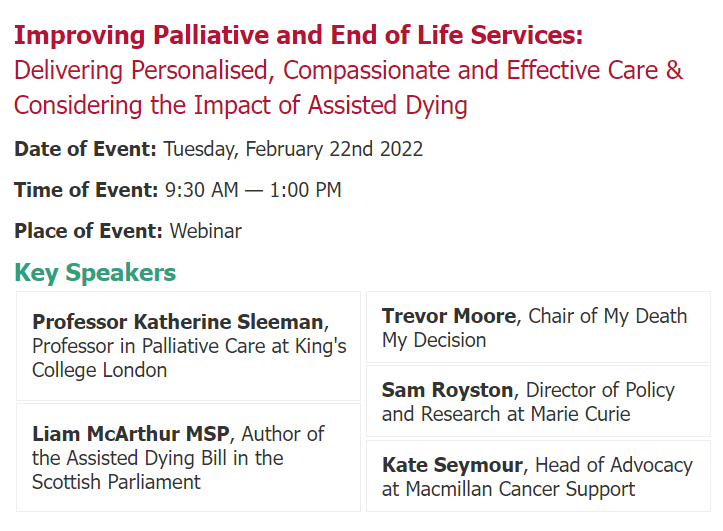
Improving Palliative and End of Life Services
Overview
According to a recent report by Marie Curie, there will be a 42% increase in demand for end-of-life care by 2040. At the same time, the report states that the sector lacks a sustainable and resilient funding model. Palliative care has played a significant role throughout the Covid-19 pandemic, and has subsequently suffered greater strain as a result – this perhaps explains why almost 15,000 people have died outside of hospital without the necessary support during the Covid-19 outbreak. While deaths at home increased during the pandemic, deaths in hospices fell slightly, with visiting restrictions and fear of infections the leading cause. In response, hospice and palliative care teams have shifted resources into the community supporting people in their home and in care homes, but have experienced shortages of essential medicines, equipment and staff.
The pandemic has only extended a trend in palliative care that has been present for over a decade. Over the last 15 years, deaths in hospital have decreased by over 10%, with more people choosing to die in hospices, care homes, and personal homes. Yet, research suggests only half of local authorities’ health and wellbeing strategies mention end of life care, only 6% prioritise it, and none cite evidence for effective interventions. There is therefore a need to readdress health policy priorities when it comes to end of life care and rethink innovative practice to improve access for those in need. Baroness Meacher’s Assisted Dying Bill similarly resonates with a belief that people have a right to decide how to end their life.
The NHS Long Term Plan has built upon previous commitments made by successive governments to personalise palliative care, recognising that people are not dying in their place of choice, the need to prepare for an actively ageing population, and the inconsistency in quality of care. In particular, the NHS National End of Life Care Programme Board has been tasked with increasing the percentage of people identified as being in their last year of life so that their end of life care can be improved by personalising it, while also building stronger regional networks to deliver care with strong clinical engagement.
To critics, though, many of these changes have only helped to once again recognise the challenges that the sector faces without instigating substantial change. In 2018, IPPR, a think tank, recommended that the government should incentivise the NHS to shift towards primary and community care, and be realistic about the cost of social care. However, local authority budgets have become even tighter as they deal with the pandemic, and there have been few budgetary measures introduced during the pandemic to directly support palliative care. Even before march 2020, Marie Curie reported that in 32% of hospitals, waiting times were more than a week for transitions to home care which fell far below the government’s target of 48 hours. Furthermore, the charity described palliative care in the UK as a “postcode lottery”, with research showing a 7% difference in quality of care decrease for those in deprived areas versus affluent areas. Change is clearly needed in order to ensure a personalised and compassionate approach to palliative and end of life care.
This symposium will provide a timely opportunity for NHS practitioners, health and social care services, local authorities, professional regulators and voluntary organisations to address the impact of the pandemic on the delivery of palliative care, discuss the areas for development within end of life services and explore how hospitals can ensure every dying person receives high-quality, personalised end of life care. The event will also discuss legislative proposals for assisted dying introduced across the British Isles – in Scotland, Westminster, Ireland and Jerseyas well as the impact of assisted dying becoming legal in recent years in jurisdictions in Australia, North America and Europe, and what this could mean for the Uk if assisted dying was to come into law.
Programme
- Examine the impact of the Covid-19 pandemic on the delivery of effective end of life care
- Look at the Assisted Dying Bill and Health & Social Care Levy Bill and what this could mean for palliative care
- Review national guidelines and policies and discuss potential strategies for improvement
- Assess ways to overcome reduced budgets and minimal resources
- Discuss how palliative care in hospitals can improve and how to best train healthcare professionals
- Analyse how to develop strong partnerships between hospices and hospitals
- Understand the reduced care that lower incomes area receive and discuss how to raise standards
- Analyse gender and ethnicity inequity in palliative care
- Determine best practice to ensure a high level of choice for patients
- Examine the financial struggle that can be caused after the death of a relative
- Identify the differences in children’s palliative care and discuss means of achieving top quality care for younger people
Who Should Attend?
- Central Palliative Care Associations
- Palliative Care Teams
- Safeguarding Adults Boards
- Primary Care Trusts
- Health Practitioners
- Social Care Practitioners
- Care Providers
- Adult Social Services
- Patient’s Organisations
- Bereavement Support Teams
- Dementia Care Teams
- Dementia Nurses
- Memory Clinics
- Clinical Leads and Specialists
- Geriatric Health Teams
- Geriatric Psychiatrists
- Community Health and Outreach Teams
- Disability Practitioners
- Health Visitors
- Health Regulators
- Pensions Organisations
- Welfare and Elderly Federations
- Active Ageing Organisations
- Institutes of Lifelong Learning
- Adult Education Organisations
- Emergency Services
- Charities, Social Enterprises and Cooperatives
- Third Sector Practitioners
- Academics and Researchers
